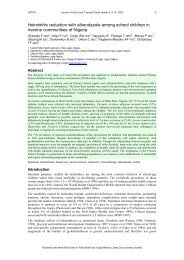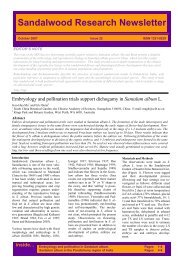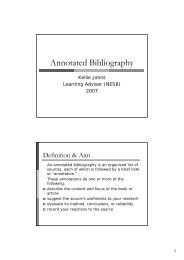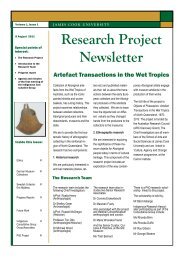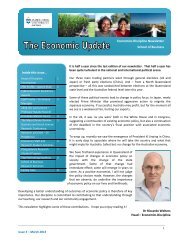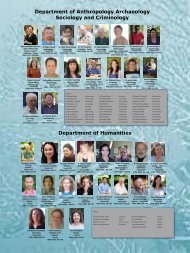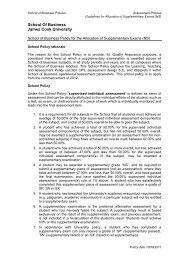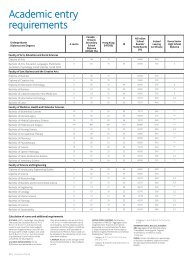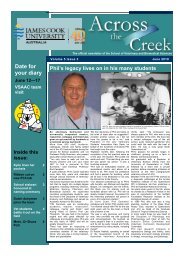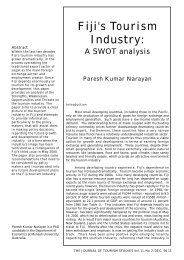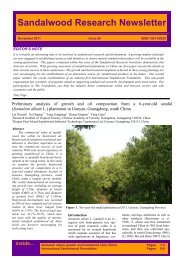Tosun Timothy
Tosun Timothy
Tosun Timothy
You also want an ePaper? Increase the reach of your titles
YUMPU automatically turns print PDFs into web optimized ePapers that Google loves.
A present-oriented mentality<br />
makes it difficult for tourism<br />
professionals to project beyond<br />
current needs and problems.<br />
Hence, public participation may<br />
generate invaluable input for<br />
planners to prepare a better<br />
development plan for sustainable<br />
tourism development.<br />
Proposition 5: Public<br />
participation contributes to a fair<br />
distribution of costs and benefits<br />
among community members.<br />
Tourism development generates<br />
social, cultural, economic and<br />
environmental costs and benefits.<br />
However, these have not been<br />
distributed fairly among stakeholders<br />
because of the disconnection<br />
between local people,<br />
tourism, and power structures<br />
among interest groups.<br />
Eadington and Smith (1992)<br />
argued that the current style of<br />
tourism development has already<br />
created 'winners' and 'losers'<br />
among local people. Furthermore,<br />
many of the 'winners' in<br />
third world resort communities<br />
are outsiders who may be viewed<br />
as exploiters of the native<br />
population and rapists of the<br />
land. There may be, as the<br />
International Institute of<br />
Tourism Studies (1991, p. 9)<br />
reported,<br />
a need to recognise that tourism<br />
must benefit the local<br />
community and that there must<br />
be broad-based participation in<br />
tourism development decisions<br />
at the community level.<br />
Several scholars have recognised<br />
that local residents have received<br />
limited and unequal benefits from<br />
tourism although they must live<br />
with its negative consequences<br />
(e.g., Brohman, 1996; <strong>Timothy</strong>,<br />
1999; <strong>Tosun</strong>, 2001; Tsartas,<br />
1992). Contributing to this<br />
situation,<br />
tourism entrepreneurs within a<br />
community may not actually be<br />
part of that community. They<br />
may be 'off-comers', strangers<br />
who import qualities which do<br />
not and cannot stem from the<br />
group itself, or they may be in<br />
some ways marginal, perhaps<br />
better equipped to profit from<br />
tourist enterprises.<br />
(Taylor, 1995, p. 488)<br />
In some destinations, the<br />
environmental and socio-cultural<br />
costs of tourism development<br />
outweigh its economic benefits.<br />
The following statement provides<br />
evidence in this regard.<br />
Having ruined their own<br />
environment, having either<br />
used up or destroyed all that is<br />
natural people from the<br />
advanced consumer societies<br />
are compelled to look for<br />
natural wildlife, cleaner air,<br />
lush greenery and golden<br />
beaches elsewhere. In others<br />
words, they look for other<br />
environments to consume.<br />
Thus armed with their bags,<br />
tourists proceed to consume the<br />
environment in countries of the<br />
Third World - the last<br />
unspoiled corner of earth.<br />
(Hong, 1985, p. 12, quoted in<br />
Brohman, 1996, p. 58-59).<br />
We don't want tourism. We<br />
don't want you. We don't want<br />
to be degraded as servants and<br />
dancers. This is cultural<br />
prostitution. I don't want to see<br />
a single one of you in Hawaii.<br />
There are no innocent tourists.<br />
(Pfafflin, 1987, p. 577)<br />
This quote and the previous one<br />
show that local people in many<br />
tourist destinations perceive<br />
tourism negatively. Moreover,<br />
often international tourists are<br />
seen as exploitative, lavish, and<br />
hedonic foreigners who lack crosscultural<br />
understanding and<br />
communication skills (Din, 1989;<br />
Dogan, 1989).<br />
Tourism development diversifies<br />
previously homogeneous communities,<br />
and these communities<br />
exhibit different responses to the<br />
growth of the industry (Dogan,<br />
1989). Indeed, tourism not only<br />
creates heterogeneous communities,<br />
it also changes power<br />
structures in tourist destinations<br />
commonly at the expense of<br />
8 THE JOURNAL OF TOURISM STUDIES Vol. 14, No. 2, DEC. ‘03<br />
indigenous people who may be<br />
excluded from tourism development<br />
and decision making<br />
altogether. In this context, Hall<br />
and Jenkins (1995, p. 77) argue<br />
that<br />
awareness of the political<br />
dimensions of tourism, and<br />
more particularly the uneven<br />
allocation of power in a society<br />
or a community, should caution<br />
us about the representativeness<br />
of outcomes of tourism<br />
planning exercises.<br />
In some countries, particularly at<br />
the beginnings of tourism<br />
development, the domain of<br />
bargaining quickly becomes<br />
focused narrowly upon certain<br />
material reciprocities. Entrepreneurs<br />
seek an exaction fee for<br />
public space, an abatement of<br />
property tax and other<br />
development incentives. The<br />
rounds of negotiation continue<br />
without regard for long-term<br />
consequences: distributional<br />
inequities and externalities. For<br />
example, <strong>Tosun</strong> (2001) claims<br />
that the Turkish tourism<br />
industry received generous<br />
incentives during the 1980s,<br />
which may be partly due to<br />
pressures by private entrepreneurs<br />
on decision-makers,<br />
which has resulted in inequalities<br />
in the early 2000s. In many<br />
ways, tourism development has<br />
created a get rich mentality. The<br />
end product may be that local<br />
people increasingly come to feel<br />
alienated, and consider that<br />
tourists’ needs are catered to<br />
ahead of local needs, and that<br />
infrastructure and facilities are<br />
not available to locals (D'Amore,<br />
1983).<br />
These arguments suggest that<br />
many tourist destinations need<br />
an alternative approach to<br />
tourism development, which may<br />
spread both its costs and benefits<br />
equitably and which would be<br />
more sensitive to its sociocultural<br />
impacts. Moreover, a<br />
large proportion of local people<br />
should benefit from tourism<br />
rather than merely bearing its<br />
residual burdens. Community-



